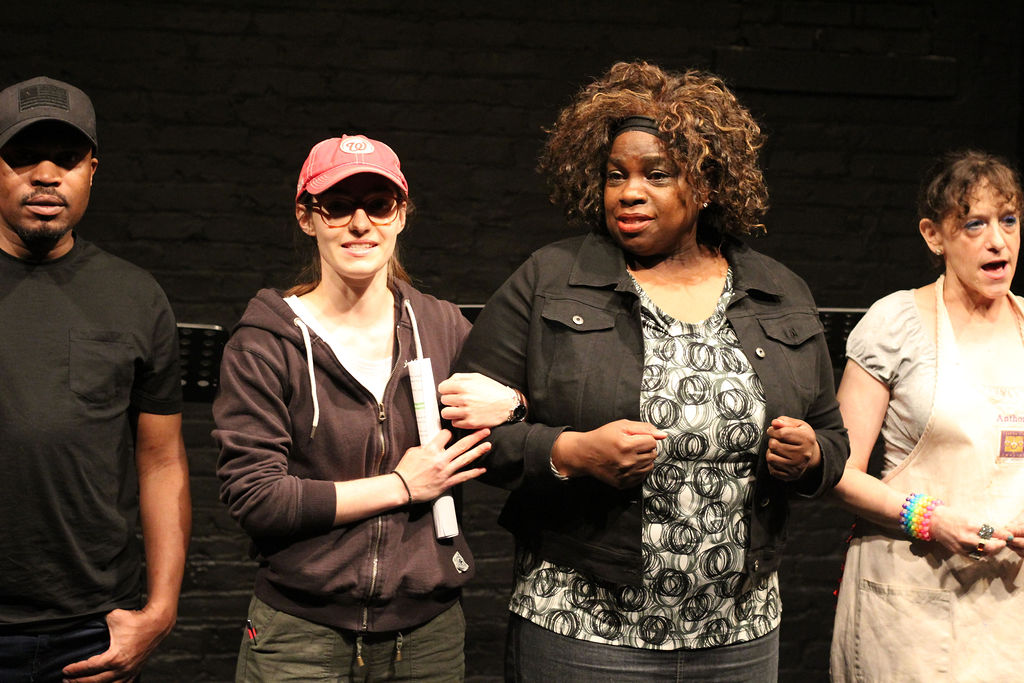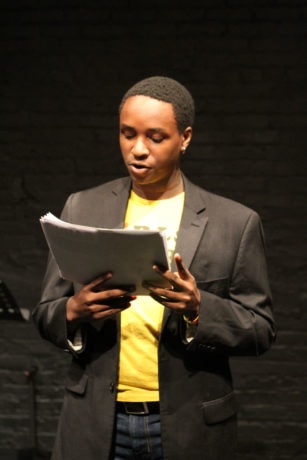In the midst of Pride season, and in the 50th anniversary year of the Stonewall riots that defined the beginning of the modern gay rights movement, Rainbow Theatre Project presents a look at the history and setting of 1969’s dramatic events.

Stonewall 50, directed by Stephanie Kelly, consisted of four short plays concerning Stonewall, framed by sections of “The Book,” a narrative history of Stonewall written by Ann Bausum. The historical writing was interesting, fluid, and well delivered by the eight-person cast. But a history lecture, even a good one, is not intrinsically theatrical.
The historical narrative and the four plays were presented reader’s theater style, with actors on book, mostly using music stands. During the four plays, one actor typically sat off to the side, reading the stage directions. I am a strong admirer of, and sometime participant in, reader’s theater productions, and it was refreshing to see the material presented in this fashion. But for actors, it is a style different from normal stage presentation, requiring a fine balance between reference to the script and relating in a well-timed fashion to other actors and the audience. Some members of the cast appeared more comfortable with the format than others.
Of the four plays, the first, Tattoo, by Jack Calvin Hanna and Tim Caggiano, was the most dramatically effective. It featured Lalo Medina as Manny, a cross-dresser, and Chris Rios as Jimmy, a cop arresting Manny in the context of the police raid on the Stonewall Inn. They are longtime acquaintances, and Jimmy’s dilemma in deciding whether to do his duty by bringing Manny, in handcuffs, back to the station or to release someone who he knows to be a good person created character interest.
The next play, the earnest One Giant Leap, by Jonathon Benjamin, featured strong portrayals by Kelly Jones, as Queen, as the name suggests, a drag queen, and Kris Roth as the sympathetic mother of a young woman about to come out as a lesbian. One of the strengths of the Rainbow production was its emphasis on the sometimes-overlooked role that drag queens, cross-dressers, and transgender individuals played in the Stonewall uprising. (New York City recently announced plans to erect statues, near the Stonewall Inn, of Sylvia Rivera and Marsha P. Johnson, two transgender activists deeply involved in the 1969 events.)
In Tea in the Hudson, by Jeffrey Higgins, Miguel (Medina), a rent boy, and his friend Francisco (Rios), debate with Miguel’s affluent client Richard (Christopher John), the best strategy to pursue. Richard, a Mattachine Society supporter, argues for polite, respectable, gradualist lobbying to advance gay civil rights, while Miguel and Francisco advocate direct action in the streets. The play leans heavily toward direct action, understandable in the context of a production about Stonewall, but perhaps unfair to the Mattachine Society and other pre-Stonewall advocates, like DC’s great pioneer, Frank Kameny, who were instrumental in the creation of gay rights as a concept.

The production was rounded out by Stonewall: In Our Words, written by Hanna and Caggiano, an oral history of the Stonewall story from the perspectives of several participants.
One of the points emphasized in the show’s content was that, in 1969, the Stonewall Inn was a gritty, grimy, Mafia-run joint that, but for sporadic police raids, served as a safe space for what was then a highly marginalized population. To their lasting credit, people there fought back. Today, Stonewall is a National Monument, cleaned up and gentrified like the Greenwich Village neighborhood in which it is located, and it has become something of a tourist attraction.
The original Pride parade, “Christopher Street Liberation Day,” took place in June 1970, a year after the Stonewall riots, and it was very much a political protest. Fifty years on, Pride parades and festivals, while not ignoring their protest roots, have largely become a combination of celebrations, parties, and marketing opportunities. It’s a good thing that our community has much to celebrate, not least the openness that is now possible in many parts of the country. But remembrance of the oppression against which the Stonewall protesters struggled not long ago is salutary, particularly in the face of continued discrimination (above all against transgender people) and attempts to claw back hard-won LGBT rights by ideologically-motivated and opportunistic interest groups and politicians. Stonewall 50 served that useful purpose.
Stonewall 50 is presented through June 2, 2019, by the Rainbow Theatre Project at the DC Arts Center, 2438 18th Street, NW, Washington DC. Purchase tickets online.
Stonewall 50 Actors: Moses Brossenbroek, Christopher John, Kelly Jones, Kathleen Lowry, Lalo Medina, Christopher Rios, Kris Roth, Michael Saint-Andreas




